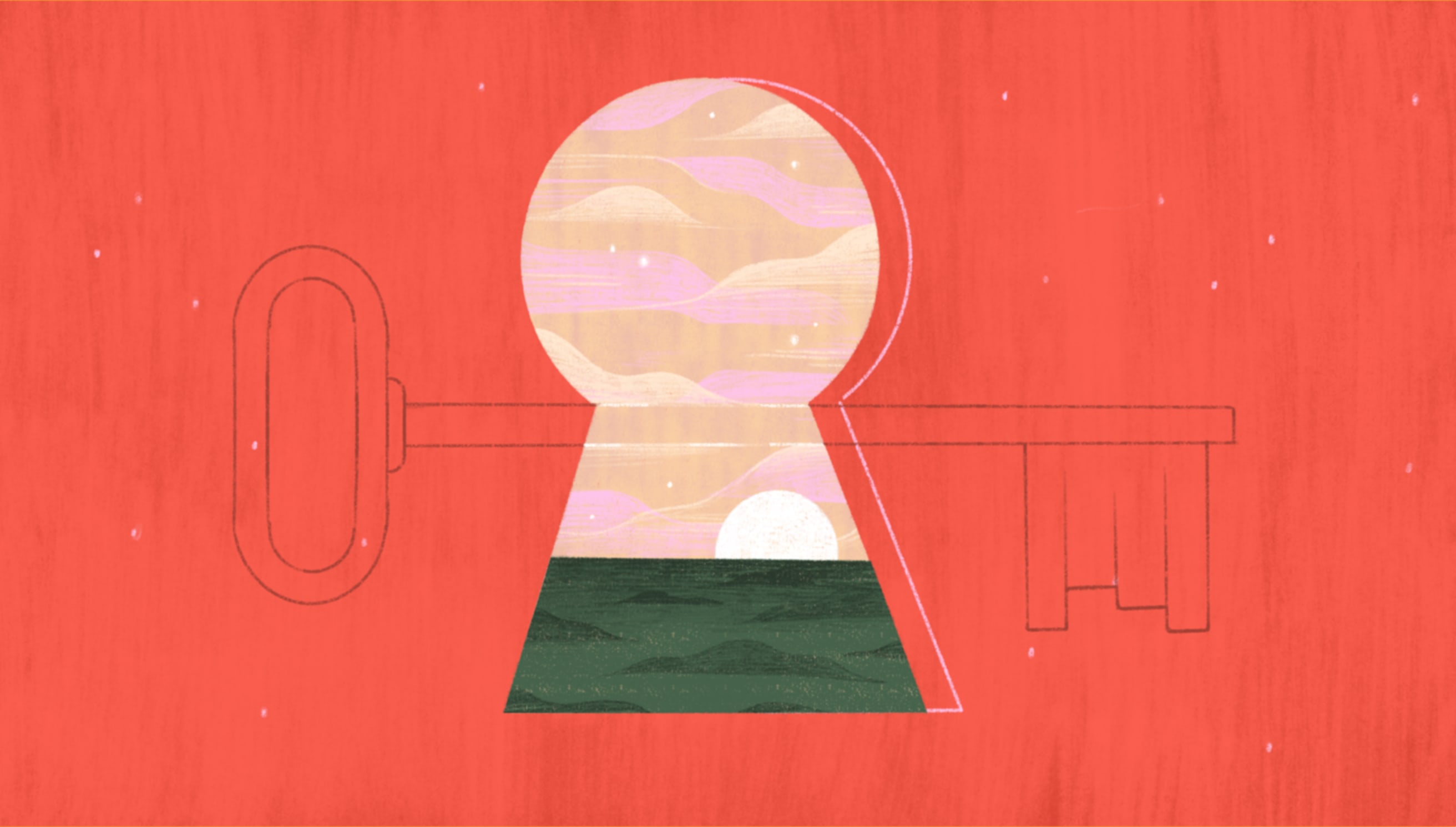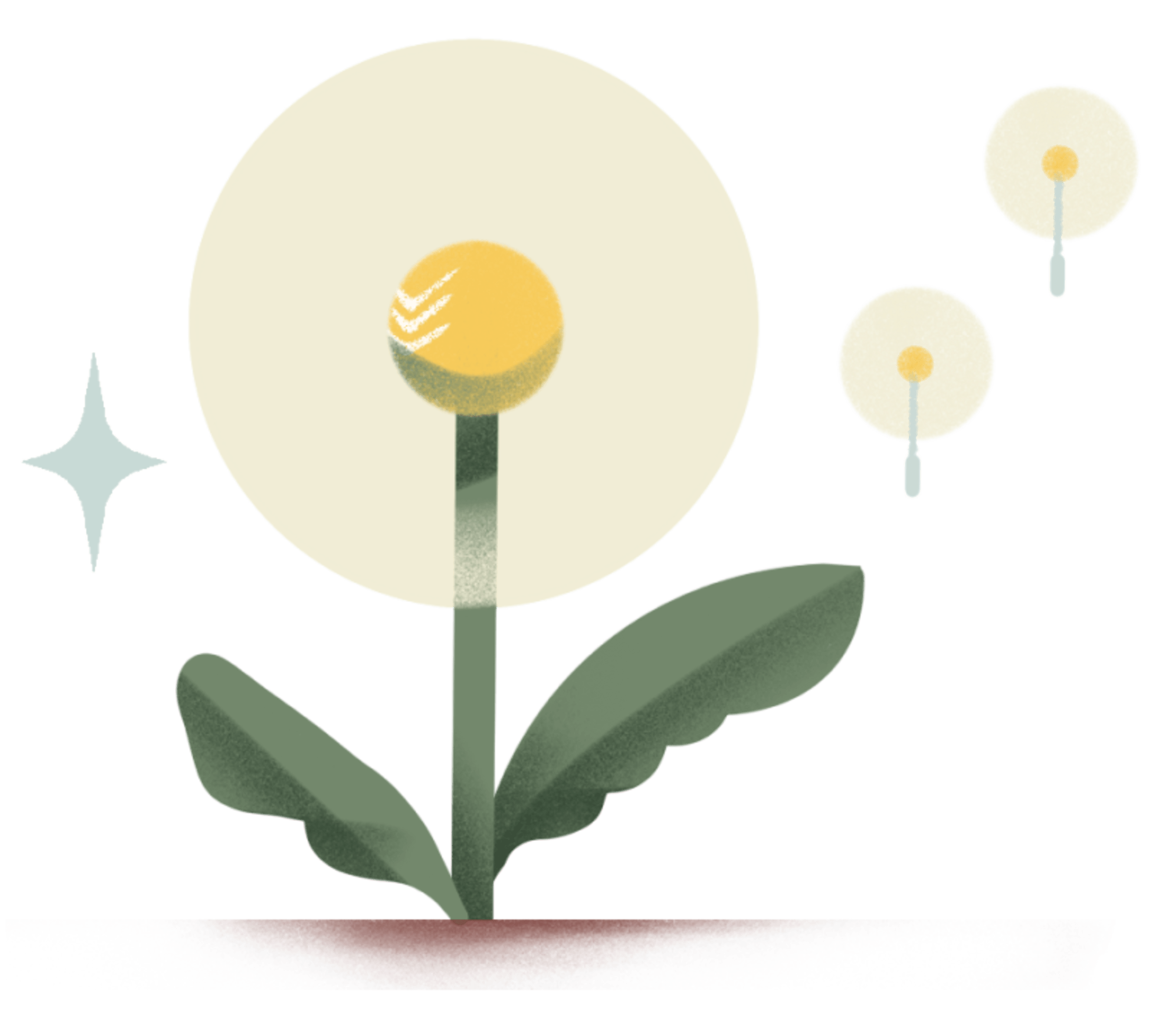Todoist is designed to be simple to use, yet powerful enough to take on your most ambitious projects. To make sure you're in the know about just how powerful Todoist can get, we’ve put together a list of 19 lesser-known features that make adding and organizing your tasks faster, more personalized, and, dare we say it, more fun.
Read on to learn something new, whether you’re a seasoned Todoist veteran or just getting started today.
Navigate Little-Known Todoist Features
Skip directly to a feature by using our table of contents below.
-
Add emails as tasks from Gmail whether you’re on web or mobile.
-
Add articles and websites as Todoist tasks using browser extensions.
-
Use templates to create reusable project checklists.
-
Forward emails to Todoist as new tasks or comments.
-
Copy & paste multiple lines of text to create new tasks from each line.
-
Drag and drop the “+” button to create tasks, sub-tasks, & sections in the middle of a list (iOS & Android).
-
Add emphasis with bold, italics, hyperlinks, emojis, and more.
-
Set due dates to recur based on the last completion date.
-
Customize your swipe gestures (Android & iOS).
-
Auto sync with your device’s Dark Mode (Android & iOS).
-
Create new tasks, set due dates, and more with voice commands.
-
See every task in a project and its sub-projects by using “##” in a filter query.
-
Use “Assigned to” and “Assigned by” filter queries to keep track of delegated tasks.
-
Never forget a task again with automatic and location-based reminders.
-
Use project calendar feeds to visualize your tasks in any calendar app.
-
Use keyboard shortcuts to speed up your task management.
-
Use various add task shortcuts on iOS and Android to capture tasks on the go.
-
Customize your daily/weekly goals & turn on Vacation Mode to preserve your goal streaks.
-
Create your own task automations with IFTTT or Zapier.
1. Add emails as tasks from Gmail whether you’re on web or mobile
Many of you already use the Todoist Gmail plugin to turn emails into tasks, but it only works when using Gmail on Chrome.
With the native Gmail Add-On, you can turn emails into Todoist tasks from anywhere you use Gmail — from the Gmail app on your iOS or Android phone or the Gmail web app on any browser. You’ll have more flexibility to add tasks from wherever you are, whenever an idea strikes.
Doist’s Head of Business Development Chase Warrington uses the integration to keep his incoming emails manageable:
“I turn any email that will take more than 5 minutes to answer into a task.”
⬆️ Back to the table of contents
2. Add articles and websites as Todoist tasks using browser extensions
The web holds more information than you could consume in an entire lifetime, which is a blessing and a curse — especially when you need to focus. Todoist can help.
If you stumble upon a captivating website during deep work — whether that’s an article on how to learn anything or a music video you can’t wait to watch — you can simply add it as a Todoist task that links back to the content.
It’s easy and fast. First, install the browser extension. Then whenever you’re on a page you want to save for later, you can add it as a task in two ways:
- Click the Todoist icon in your extensions bar. From there click the + button and then Add website as task, where you can add any details before hitting Add task.
- Right click anywhere and select Add to Todoist. The task will be added to your Todoist Inbox with a linked site name, allowing you to revisit the page later.
⬆️ Back to the table of contents
3. Use templates to create reusable project checklists
It’s easy to duplicate tasks within a project, but did you know you can duplicate entire projects too? With project templates, you can create, refine, and even share checklists for any project you need to complete on a regular basis. Here at Doist, we use templates for new feature launches, blog posts, new employee onboarding, and more.
We’ve put together a repository of popular project templates to get started with. Or you can create your own.
⬆️ Back to the table of contents
4. Forward emails to Todoist as new tasks or comments
When you’ve got important information in an email and you need to get it into Todoist, forwarding is the fastest way. There are two ways to do this: You can forward an email into a Todoist project to create a new task with the email in the comments, or you can forward the email into an existing task’s comments. Here’s how:
Forward an email into a project: First, follow our directions for getting a unique email address for your Todoist project. You can then forward emails to that address. A new task will be created with the e-mail subject line as the task name and the body of the email will be attached in the task’s comments, including any attachments under 25MB.
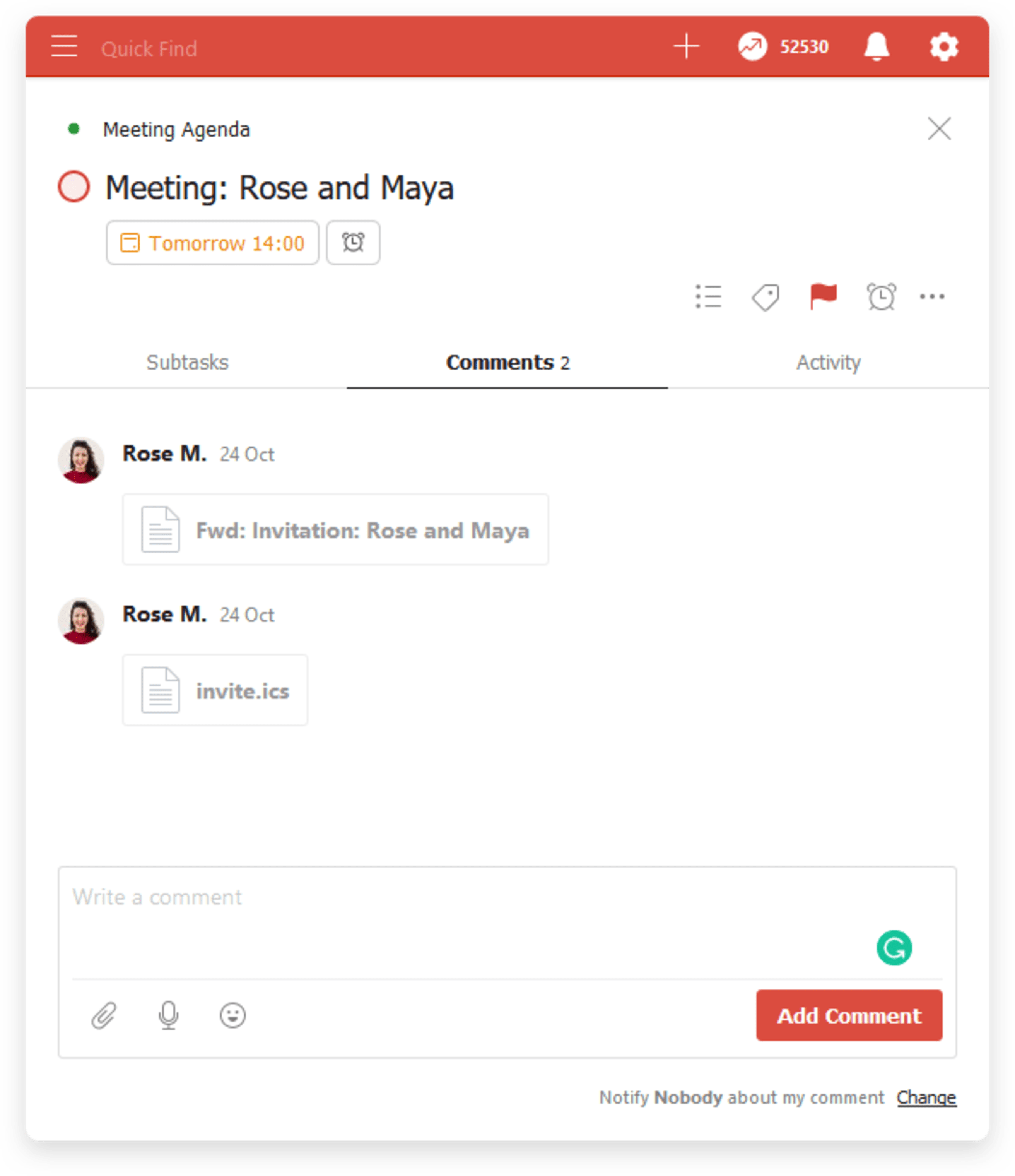
Forward an email into a task: First follow our instructions to get a unique email address for a specific Todoist task. Any emails you forward to it will be attached to the task’s comments.
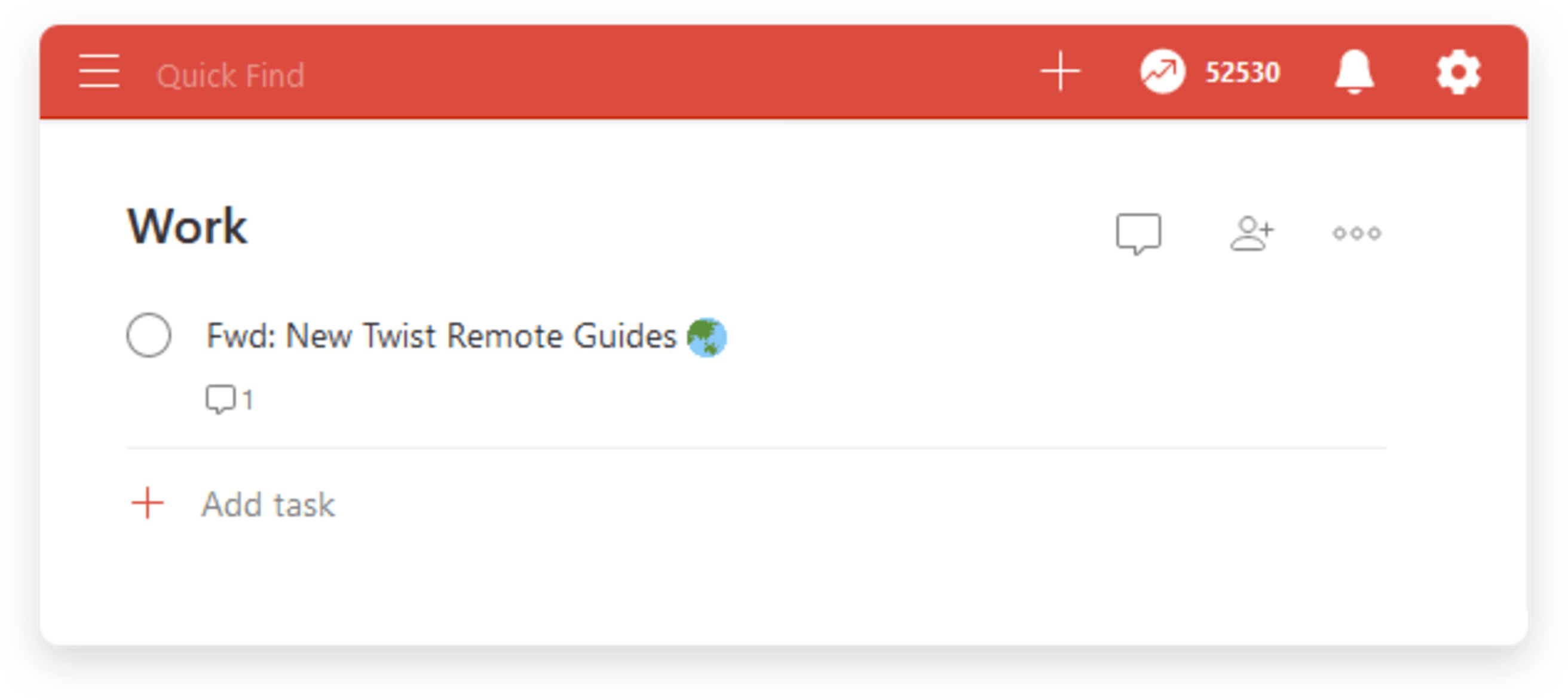
⬆️ Back to the table of contents
5. Copy & paste multiple lines of text to create new tasks from each line
If you have a list of tasks in plain text — action items from meeting minutes, project timelines, personal notes, article takeaways, etc. -- you can copy and paste those lists into Todoist to create separate tasks in seconds.
Simply highlight and copy the lines to your clipboard, open a new task in Todoist, and paste everything into the task field. Todoist will ask if you want to create a new task for each line you copied and pasted. Just like that, you’ve added 25 new tasks in about 3 clicks. As a writer and editor, I use this little-known feature all the time for turning outlines into Todoist tasks.
⬆️ Back to the table of contents
6. Drag and drop the “+” button to create tasks, sub-tasks, & sections in the middle of a list (iOS & Android)
One of the things people love most about Todoist is how much control you have over your projects. It’s easy to add tasks, sub-tasks, and sections and drag them wherever you need them. However, it’s always been a bit easier to drag and drop your tasks on desktop than mobile.
With the Todoist Foundations launch, you can now drag and drop to create new tasks, sub-tasks, and sections on mobile, too.
Simply press and hold the “+” button in the bottom right and drag it to the spot on the list you want to create a new task. Drag it slightly to the right underneath an existing task to make it a sub-task, or drag it to the far left to make it a new section.
⬆️ Back to the table of contents
7. Add emphasis with bold, italics, hyperlinks, emojis, and more
Some tasks need hyperlinks. Some comments require code snippets. Some labels are best expressed in emoji. Luckily, Todoist gives you a number of text formatting options in task, label, and filter names as well as in task and project comments:
- Bold: **This text will be bold** or __This text will be bold__
- Italic: *This text will be italic* or _This text will be italic_
- Bold & italic: ***This text will be bold & italic*** or ___This text will be bold & italic___
- Hypertext: [This text will be hyperlinked](https://todoist.com/) or https://todoist.com/ (This text will be hyperlinked)
When writing a comment, Todoist also supports the following:
- Inline code: `this text will be inline code`
- Code block: ```this text will be in a code block```
And of course, you can add emojis anywhere you can type text. 😊
A note on hyperlinks: If you copy and paste a URL into a task, Todoist will automatically convert the URL to the title of the page and make it clickable without any special formatting. Doist’s founder and CEO Amir Salifhefendic takes advantage of this feature daily:
“I have a project called Articles where I add links, and Todoist converts them to article titles I want to read.”
⬆️ Back to the table of contents
8. Set due dates to recur based on the last completion date
As the task manager with the smartest date recognition on the market, Todoist can recognize any recurring due date you type into it, from “every weekday” to “every 3rd Tuesday” to “every 3rd of the month starting Apr 1 and ending Oct 13”.
What you may not know is that you can also set a date to recur based on when a task was last completed. For example, I have a task called “Balance my accounts 💸” that I want to do every month. However, it’s a task that I often put off. If I set the date for “every month starting feb 1”, the task will reset for March 1 even if I complete it on February 28. But I don’t need to balance my account again just 3 days later. Instead, I can use “every!” as in “every! month starting feb 1”, and when I complete the task on February 28 the next date will be set for March 28.
Using “every!” in recurring dates is perfect for those tasks that need to be completed on a regular basis but not on a specific day.

⬆️ Back to the table of contents
9. Customize your swipe gestures (Android & iOS)
One of the most satisfying gestures on today’s ubiquitous touch screens is the swipe. In Todoist, you can customize this all powerful-gesture so whenever you swipe left or right on a task, Todoist performs one of a number of actions.
As of this writing, you can choose swipe to either schedule the task, complete the task, or select the task (especially handy if you often need to edit multiple tasks at once).
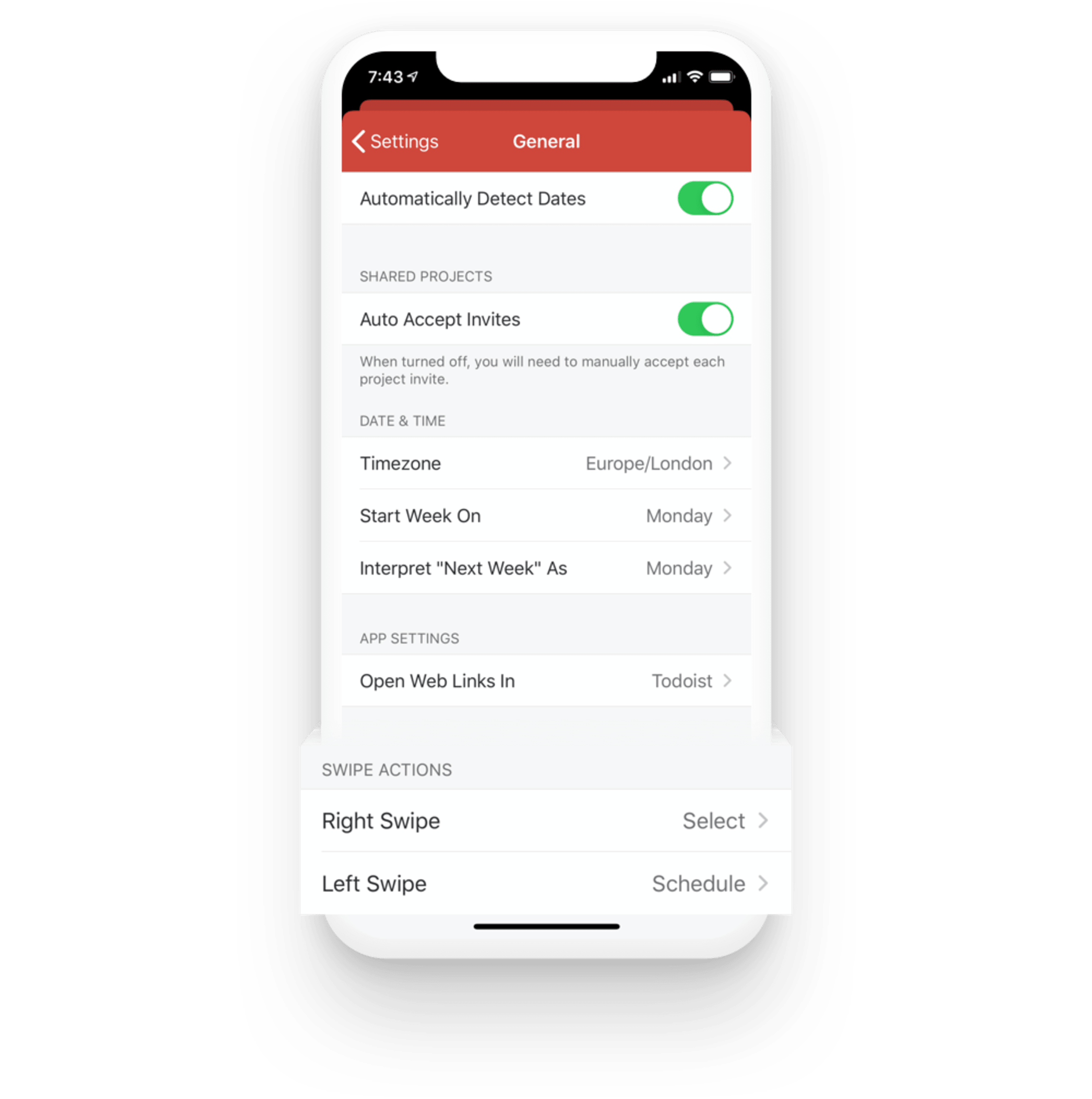
⬆️ Back to the table of contents
10. Auto sync with your device’s Dark Mode (Android & iOS)
2019 was the year of dark modes, with both Android and iOS launching their own. Todoist wasn’t far behind, either, as we released our long-requested Dark theme.
But did you know you can automatically sync your Todoist Dark theme with your device? If you have your phone set to automatically turn on dark mode at night, Todoist will automatically switch to Dark theme when your phone does. Go to Settings > Theme and make sure the “Auto dark mode” (“Auto dark theme” on Android) is turned on. Then enjoy not being blinded by an unexpected white screen at the end of the day.
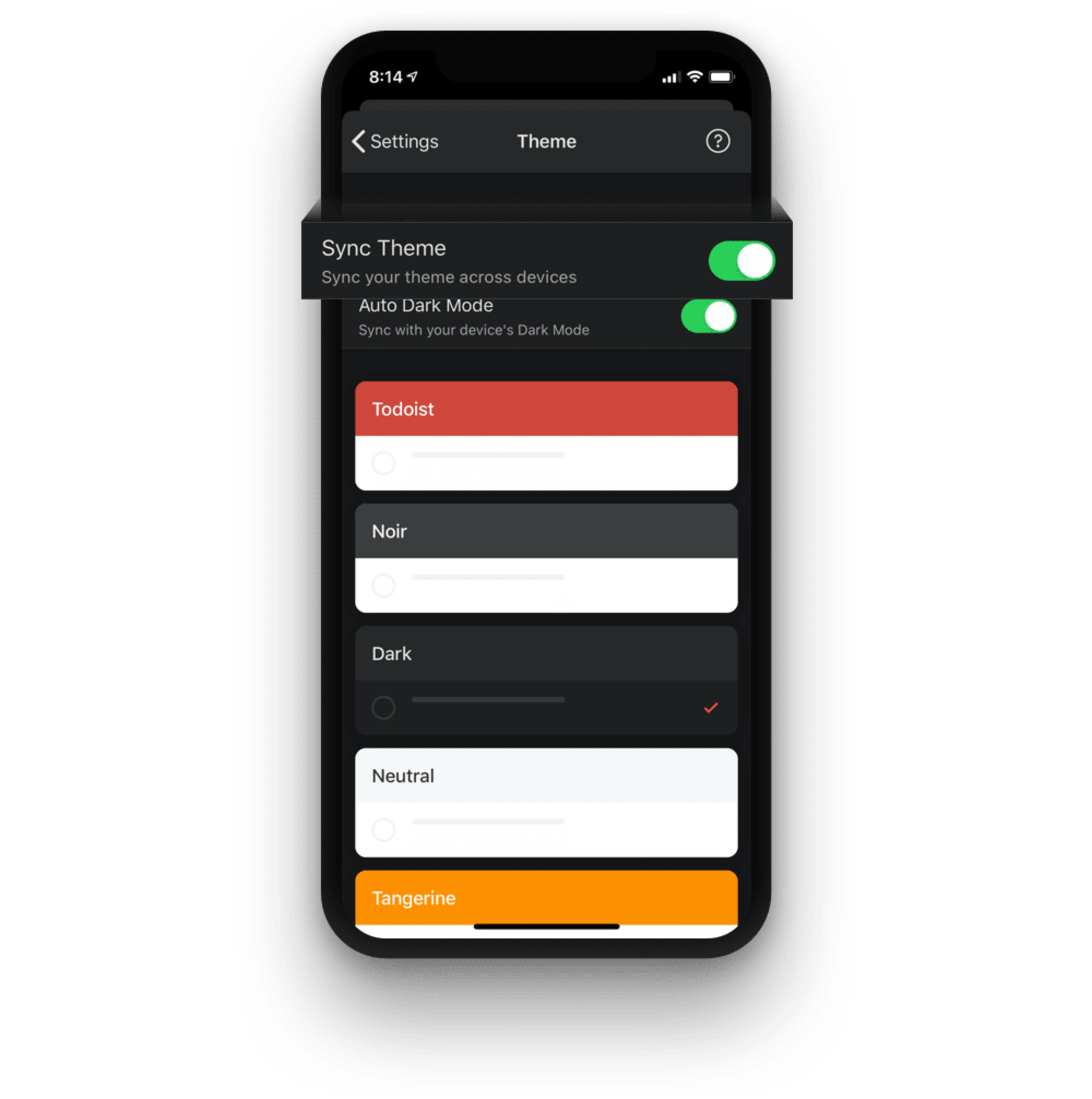
⬆️ Back to the table of contents
11. Create new tasks, set due dates, and more with voice commands
Our goal is to make Todoist your all-purpose task capture device. No matter where you are or what you’re doing, it should take mere seconds to quickly add a new task and continue on your day.
That’s why we have integrations with all of the major voice assistants, so you can ask Siri, Google, or Alexa to add a new task without ever having to pick up your phone. You can even use natural language to add a due date. Say something like “Alexa, add call Gloria next Sunday at 9am to my to-do list” and Todoist will create the new task with the right due date and time.
Voice controls also work with Todoist for Apple Watch and Android Wear so you can dictate new tasks from your wrist.
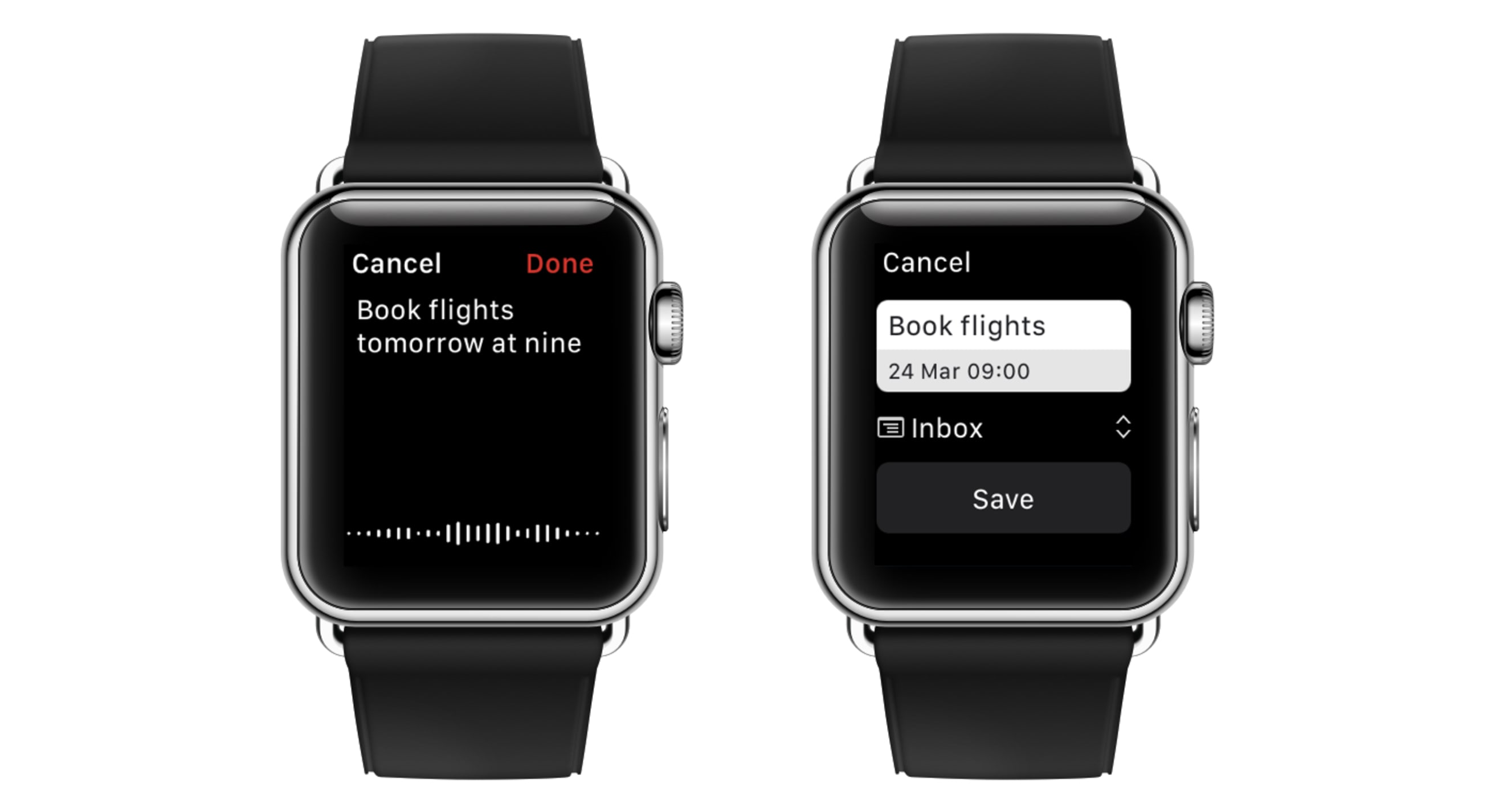
⬆️ Back to the table of contents
12. See every task in a project and its sub-projects by using “##” in a filter query
Filters are a powerful way to create your own custom task views that fit your specific workflow. But getting the queries just right can be tricky. The double hashtag syntax is a little-known tag that lets you see a project and its sub-projects in one place.
Let’s say you have split your “Work” project into several sub-projects like “Design”, “Development”, “Meetings”, etc. To build a “Today’s Work Tasks” view, simply use the filter query “today & ##Work” to see all of the tasks in your Work project and any of its sub-projects that are also due today. This kind of custom view makes it easier to focus on just the tasks you can work on right now and keeps all other tasks out of sight for later.
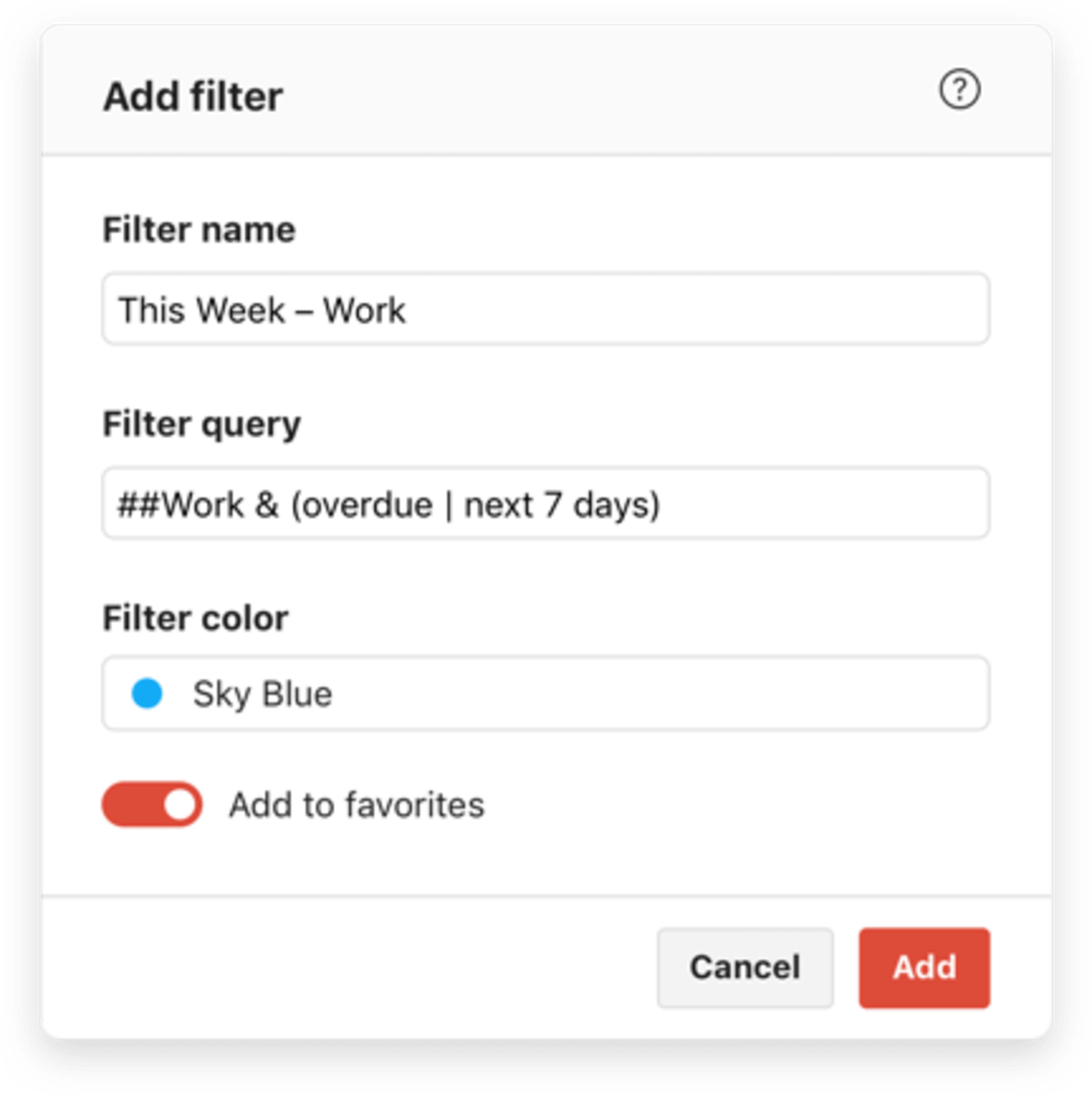
⬆️ Back to the table of contents
13. Use “Assigned to” and “Assigned by” filter queries to keep track of delegated tasks
Whether you’re collaborating with coworkers, splitting the chores with housemates, or keeping track of errands with a loved one, it’s easier to get things done when you can share the workload.
In Todoist, shared projects make it easy to assign tasks, set due dates, and discuss details in comments. But once a task is delegated, it’s easy to forget to follow up on it. That’s where “assigned to” and “assigned by” filter queries come in handy.
See every task that’s assigned to other people by using “Assigned to: Others”. You can also see the tasks assigned to just one person with a query like “Assigned to: Erica”.
See every task you’ve assigned to others by using “Assigned by: Me”. In one click, you can see every outstanding task you’ve assigned to others, and follow up in the task comments if need be (hopefully everything’s right on time, though).

⬆️ Back to the table of contents
14. Never forget a task again with automatic and location-based reminders
Task reminders may not qualify as a “little-known” feature, but some of the ways you can customize them aren’t so obvious.
By default, Todoist will automatically send a reminder for any task that has a due date and time. That way, you don’t have to remember to manually set a reminder yourself. In your reminder settings, you can customize how long before a due time the automatic reminder will be sent. You can pick anywhere from 0 minutes to 1 week before the task is due.
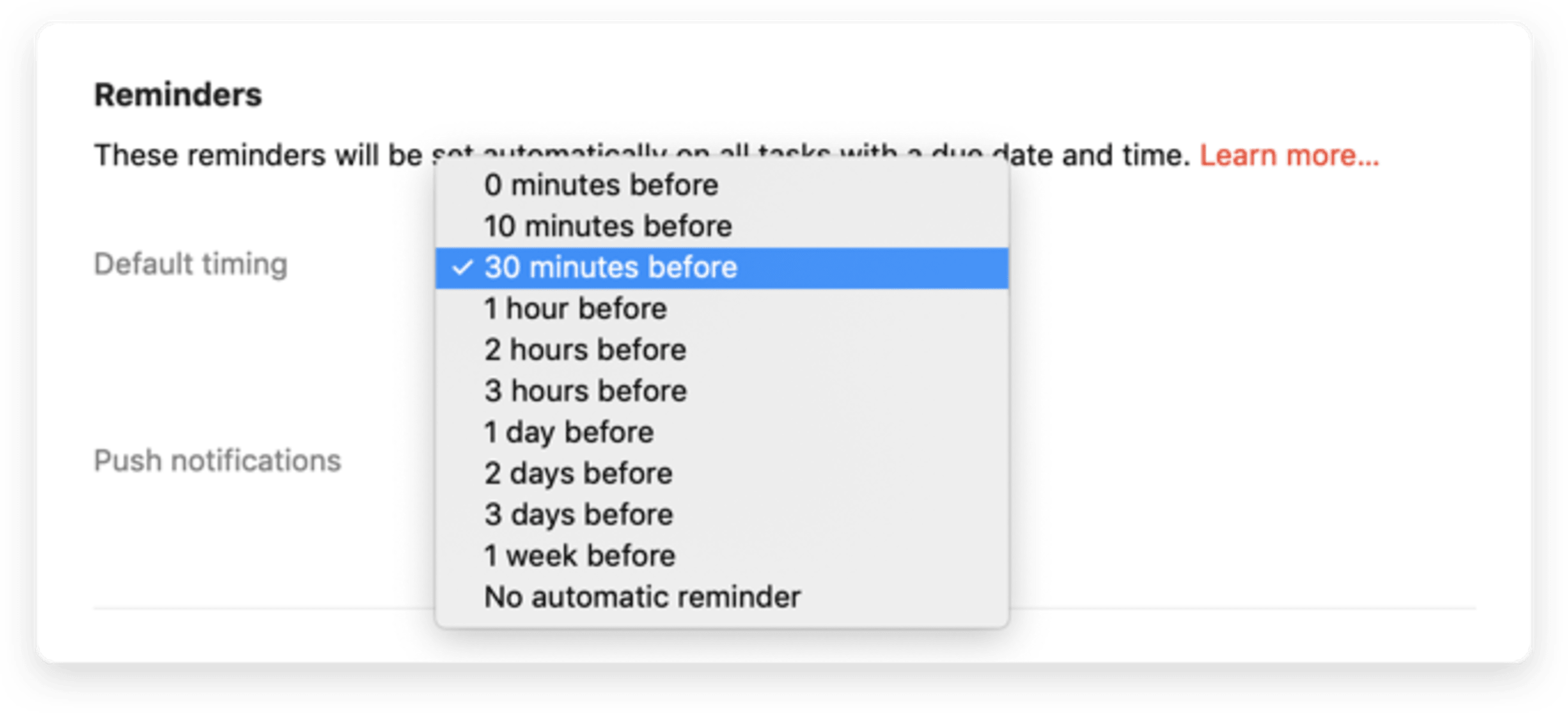
You can also set a location-based reminder. Doist’s Integrations Developer, Willian, uses this feature to make sure he doesn’t forget to buy things on his way past the grocery store:
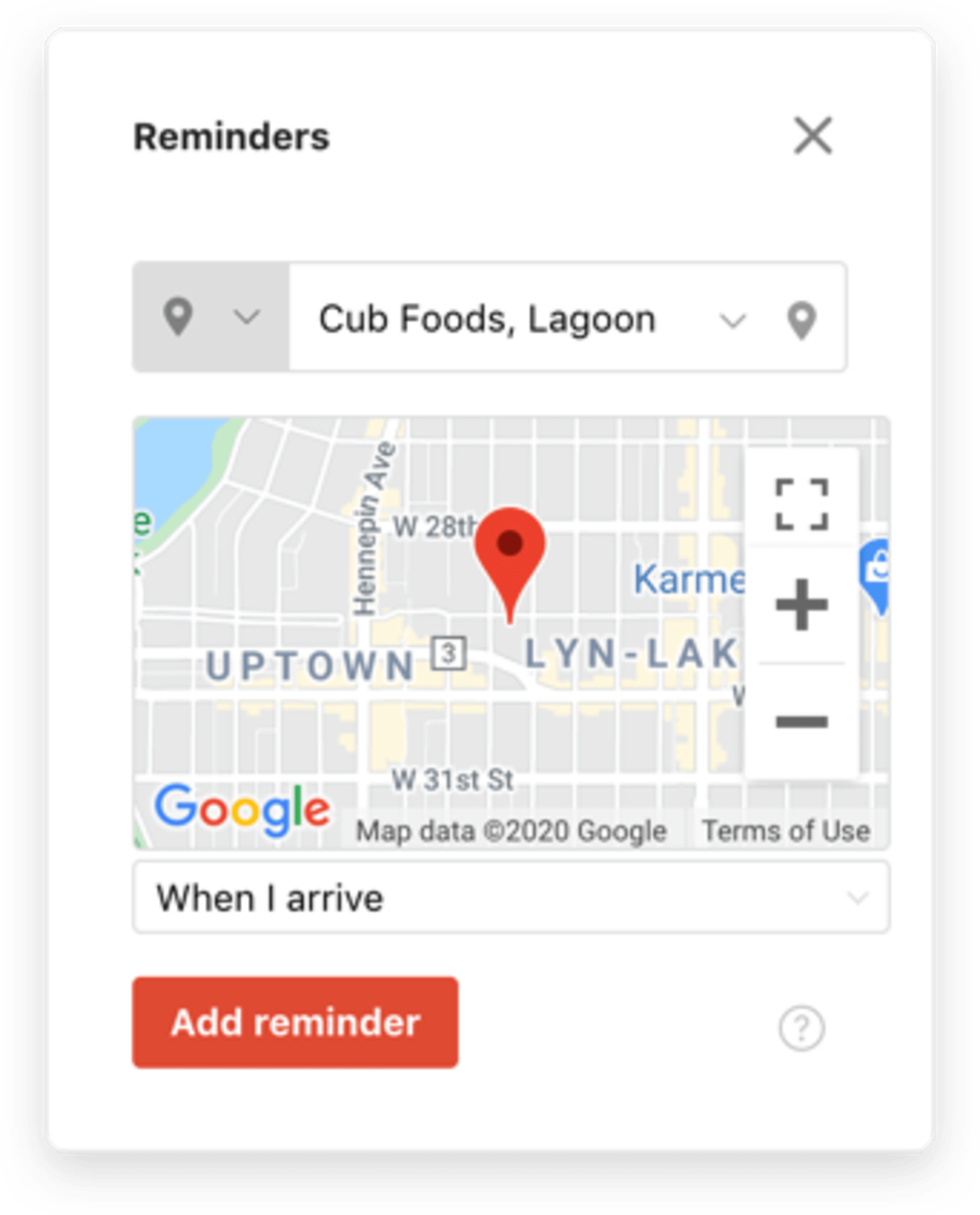
“I have an incompletable task with a location reminder for the local grocery store. Every time I'm nearby, I receive a notification to check my grocery list.”
⬆️ Back to the table of contents
15. Use project calendar feeds to visualize your tasks in any calendar app
You may already know you can sync Todoist with Google Calendar. But you can also get a calendar feed for any project and import it into your calendar app of choice. Any changes you make in the project will automatically be reflected in your calendar app. And because your tasks show up in a separate calendar, you’ll be able to toggle them on and off.
Doist Product Designer, Panos, uses this feature to better visualize financial deadlines:
“Even though I knew it existed, I only recently started using “project calendar feeds”. Specifically, I have a project where I list all my financial obligations. So far I’ve been using a filter that would give me an overview within Todoist of what’s coming in the next 7 days. But now with a project calendar feed, I’m able to see a weekly or monthly overview of everything within Fantastical.”
You can even share project feeds with others so they can follow along in their own calendars too. At Doist, we use this feature to share the content calendar for Ambition & Balance and our product roadmaps for Todoist and Twist.
⬆️ Back to the table of contents
16. Use keyboard shortcuts to speed up your task management
Keyboard shortcuts take a bit of time to learn and master. But for actions you take multiple times a day every day, it’s well worth the effort.
Here are some of the Doist team’s favorite keyboard shortcuts:
- Neil, Product Marketer: “I use keyboard shortcuts to quickly edit a lot of tasks on big product launch projects. I use ctrl+up (cmd on mac) and ctrl+down to quickly move up and down and edit tasks.”
- Gonçalo, CTO: “I use ctrl + left/right to indent tasks. It makes adding a full hierarchy with sub-tasks a breeze, without ever taking the hands off of the keyboard.”
- Me, Editor: “I love “q” to open up Quick Add and quickly jot down whatever’s on my mind. I also use “Ctrl + ⌘ + A” to pull up Quick Add from anywhere on my Mac without having to go to the Todoist app. It makes adding new tasks as soon as they come to me second nature.”
Explore all Todoist keyboard shortcuts →
⬆️ Back to the table of contents
17. Use various add task shortcuts on iOS and Android to capture tasks on the go
Todoist’s mobile apps let you add and manage tasks from anywhere, but there are various, lesser-known shortcuts on both platforms that let you add tasks even faster. Here are the best ones:
- [iOS & Android] Share any website to Todoist right from your browser using the share extension. You’ll be able to specify the project, due date, priority level, and more.
- [Android] Add the Add Task tile to your Quick Settings menu. Android Developer, Pedro Santos uses the Quick Settings tile daily: “It makes adding a task when I'm randomly doing stuff (walking on the street, shopping, etc.) super easy. I don't have to open the app or see my whole list of tasks.”
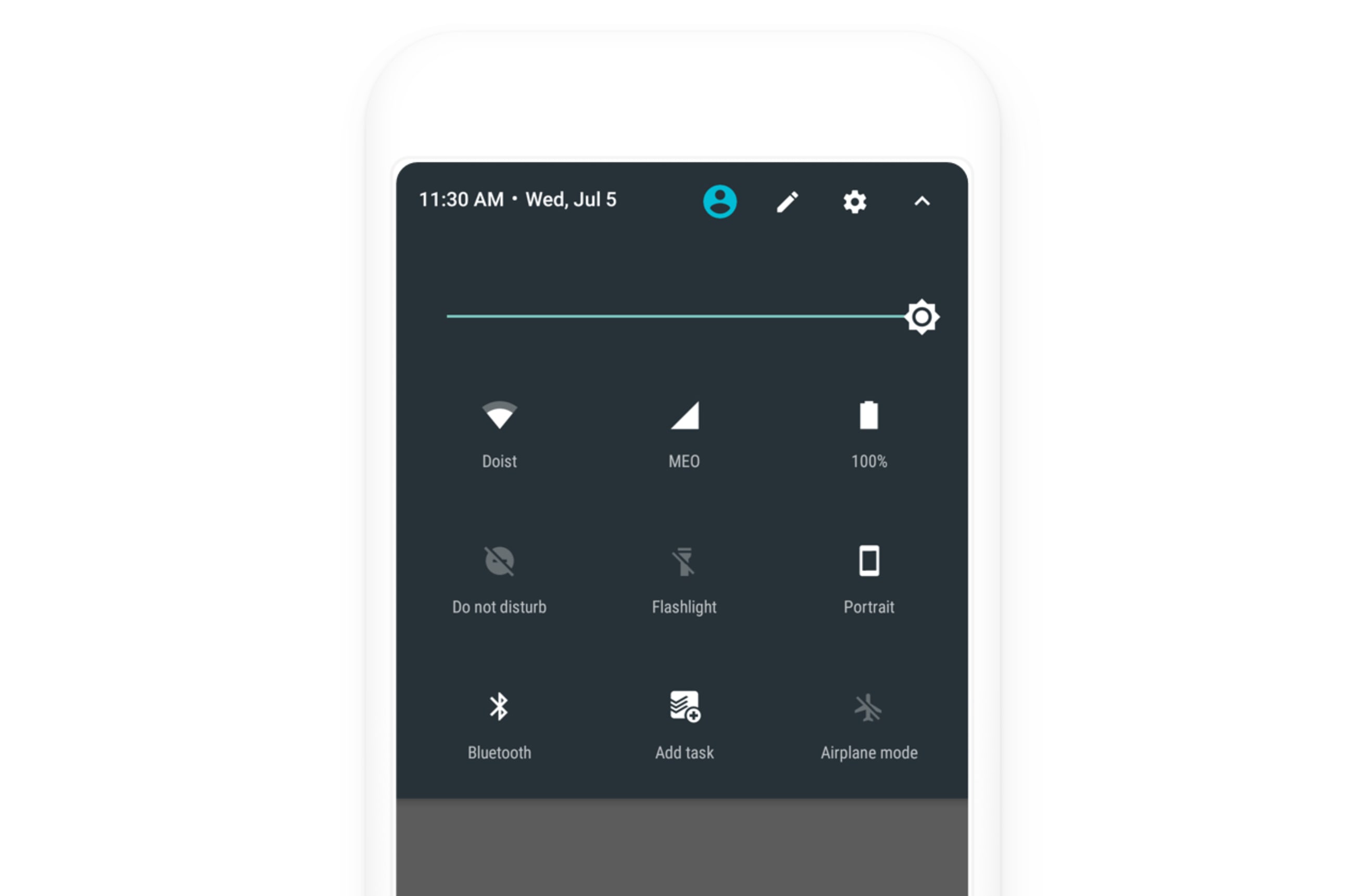
- [Android] Add the Add Task widget to your home screen and add a task immediately.
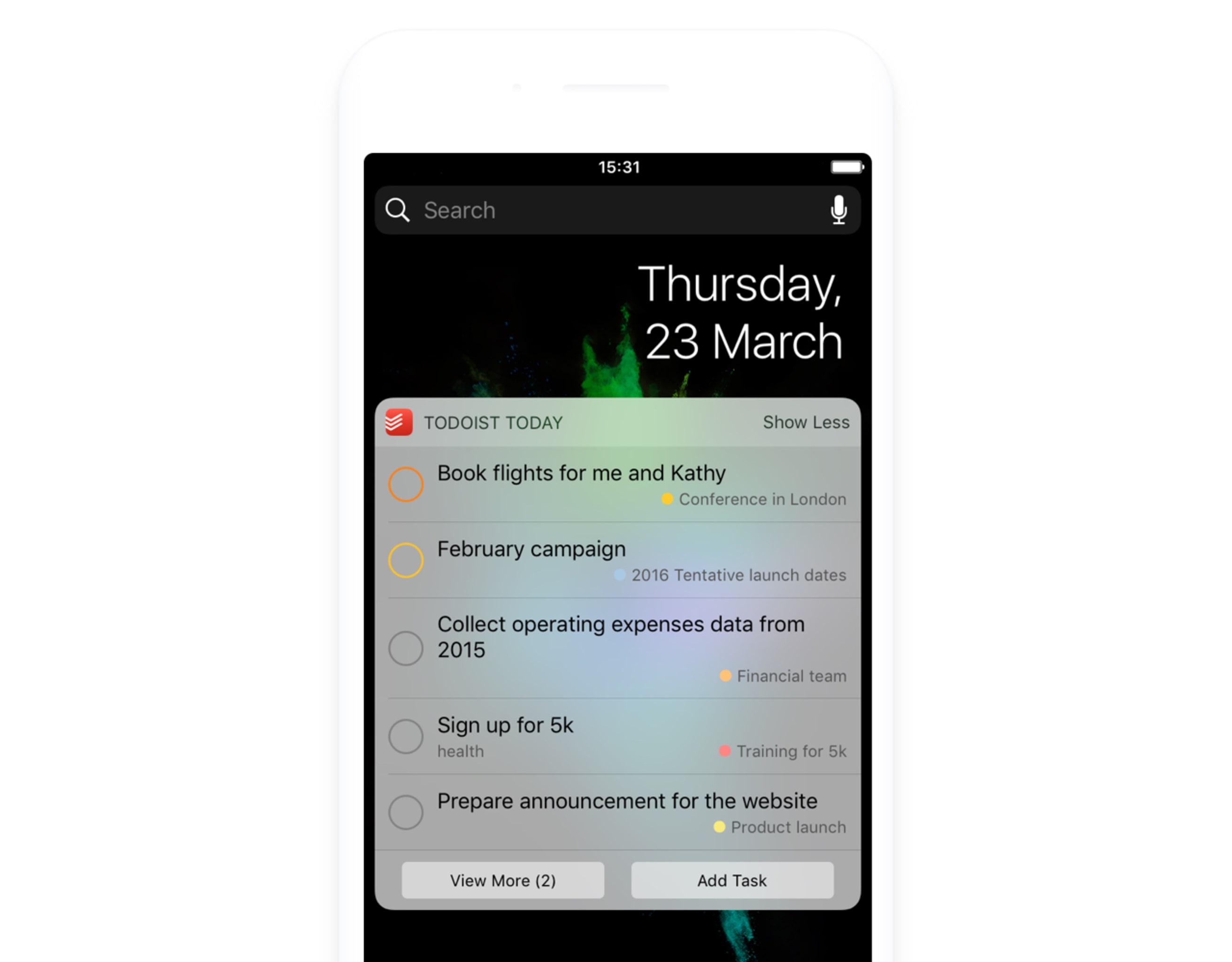
- [iOS] Long press on the Todoist home screen icon and select `Add Task`.
- [iOS] Add the Todoist widget to your Widget view.
- [iOS] Create a shortcut via the Shortcuts app to add a Todoist task to a specific project. Then add the shortcut to your home screen for easy access. For example, I have a shortcut called Shopping List that I use to quickly add items to my household’s shared shopping list project.
⬆️ Back to the table of contents
18. Customize your daily/weekly goals & turn on Vacation Mode to preserve your goal streaks
Todoist’s Karma system gamifies your productivity by awarding you points for how much you complete, docking points for tasks that are overdue, and keeping track of your daily and weekly task streaks. Building up daily and weekly task streaks can be a fun and addicting way to ensure you’re making progress on your tasks every day.
As you get more productive, level up your streaks by increasing your daily and weekly task goals. If you’re not getting as much done as you’d like, turn it to easy mode and reduce those goals.
Finally, don’t forget to turn on Vacation Mode when you want to disconnect from it all. Your daily and weekly streaks will be preserved until you get back. Find all your Karma options in the Karma tab of your Todoist settings.
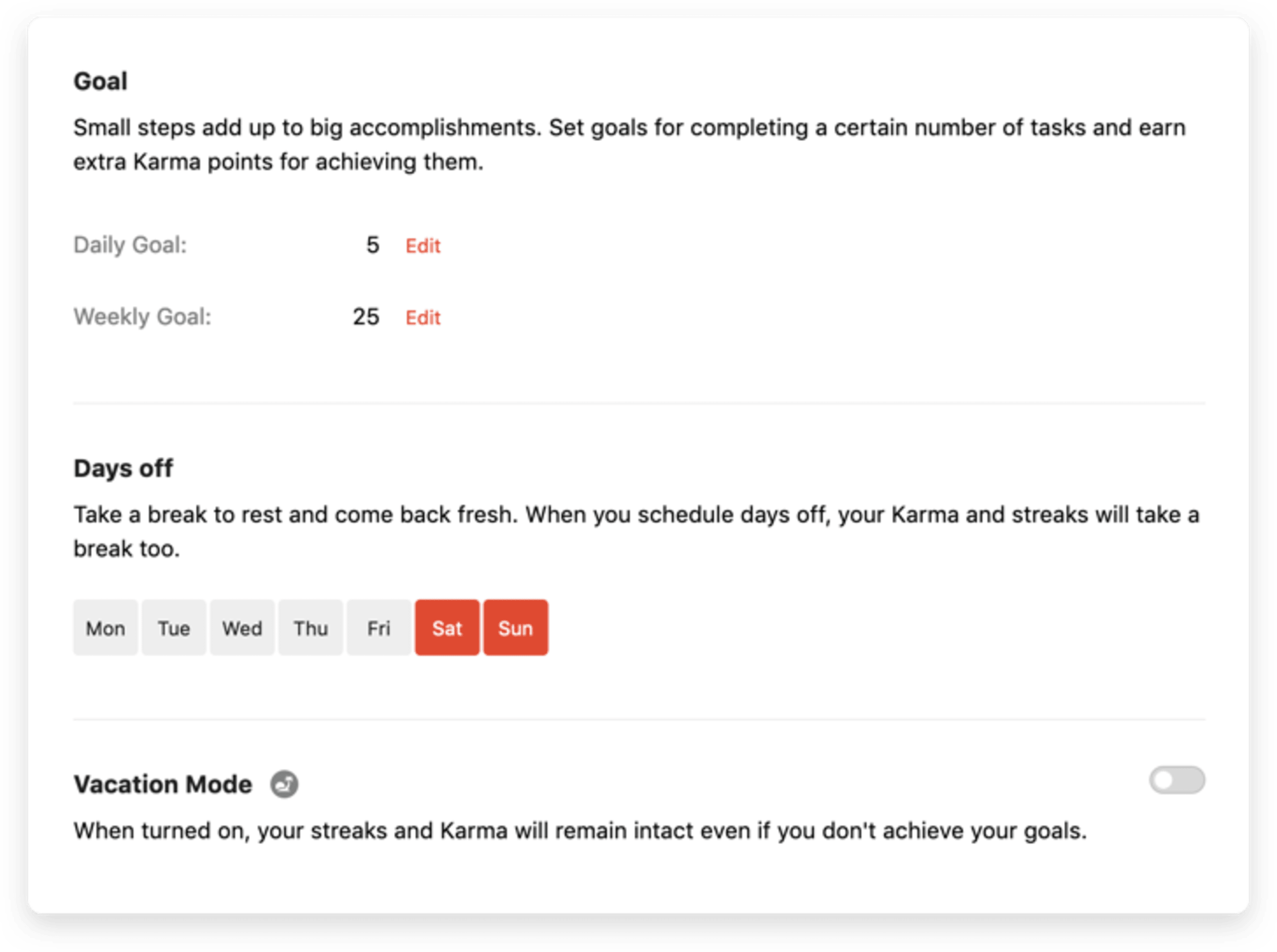
⬆️ Back to the table of contents
19. Create your own task automations with IFTTT or Zapier
Not surprisingly, when asked what his favorite, little-known Todoist feature was, our Integrations Developer, Willian, said “the smart usage of integrations”. While Todoist has dozens of useful integrations already, you can also build your own app connections and automations with aggregators like IFTTT and Zapier. Here’s Willian on IFTTT:
“I'm currently using IFTTT to build a list of things I did during the week, so I can report on Friday. Every time IFTTT sees a completed task with the @snippet label, it creates another task in a separate Snippets project. At the end of the week, I can screenshot the project list or select print and export it as a PDF I can share with the team.”
Our product marketer Neil also uses IFTTT to streamline adding tasks via Google Assistant:
“I have an IFTTT Google Assistant-Todoist recipe so I can say “Add a task, buy apples" to my Google Home or Pixel, and it will add the task "buy apples" to my Inbox with P3 and a due date of today. My wife and I have another recipe which lets us say "Add a shared task, pick up pizza", and the task is added to our #Team Inbox so we remember to eat 😊 #parentlife.”
That's just a glimpse of what's possible: Try integrating Todoist with other apps using IFTTT and Zapier and find what works for you.
⬆️ Back to the table of contents
We hope you found some helpful tidbits in this list to make your task management faster, more organized, and more personalized. What are your favorite Todoist tips and tricks that others might not know about? Share them in the comments below or tweet us @todoist!
